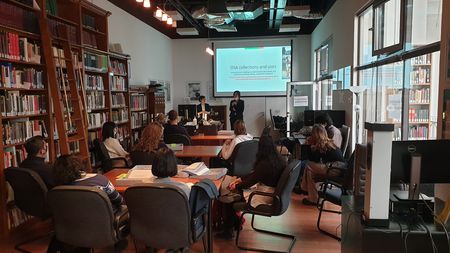Blinken OSA, with the professors and the students of the Freeszfe Association, has launched a joint project titled fearless speech in the first semester of the 2021/22 academic year. The program series includes seminars and lectures, as well as a literary competition, an exhibition, film screenings, and theater performances.
The program series continues with the History in Public Sphere (HIPS) internship course titled Fearless Speech and its fate in the archives. This internship is part of the HIPS initiative seeking to offer courses that “focuses on the ways the past is represented, contested, and negotiated in the public sphere, exploring various contexts from the Early Modern period to the present in a comparative and transnational way.” HIPS is a CEU Erasmus Mundus program, students join the program from all over the world (e.g., from the Philippines, India, Latin America, and the US), providing the Archives an excellent opportunity for wider recognition. Thus, the Blinken OSA collections get problematized and researched on a global scale. According to Blinken OSA Research Fellow Ioana Macrea-Toma, “theoretical lectures and hands-on archival research work will help future public historians to further understand the logic and epistemic assumptions of Cold War data collections, and to translate issues having a Central and Eastern European relevance to larger global frameworks."
The course instructors are István Rév, Director, and Ioana Macrea-Toma, Research Fellow, with the support of many colleagues of professional archival expertise, namely Zsuzsa Zádori, Darius Krolikowski, Oksana Sarkisova, Anastasia Felcher, Iván Székely, Katalin Székely, András Mink, Robert Parnica, and Judit Hegedűs. The course covers 18 sessions ranging from lectures to archival work, archival visits, and individual consultations.
The structure of the internship revolves around the upcoming exhibition as described in the syllabus. This exhibition is dedicated to fearless speech, seeking to address the conditions and truth content of speaking truth to power. Michel Foucault’s analyses of Greek antiquity are referenced along with examples both from the recent past and the Cold War. The students are expected to work in groups with a chosen theme of the exhibition (Courage, Censorship, Security Police, Fearless Speech and Democracy, The Right to Truth). They are to find relevant materials, analyze them, and elaborate on them. Their selections are to be used to produce a video or audio project at the end of the internship, which will be exhibited at the upcoming exhibition opening in March.
This complex work requires continuous professional guidance, supervision from colleagues and the lecturers, but is expected to yield the desired learning outcome such as:
- methodological: students learn the problems associated with archival use and exhibitions, how to produce a video piece with archival documents;
- students learn to critically approach primary archival sources, and to integrate sources for curatorial purposes; students learn to write captions and curatorial comments and to contextualize sources;
- theoretical and historical: students will acquire historical notions about genealogies of truth-telling, Cold War, dissident cultures.

